Perhaps somewhat unexpectedly, Ousmane Dembele ended up swapping Barcelona for Paris Saint-Germain and will continue his career in Ligue 1.
It comes as a surprise mainly because he was the centrepiece of Xavi’s tactical identity and the player who was meant to be the leading player of the coach’s project.
Alas, he is in La Liga no more.
Whether he’ll succeed in the French capital is an entirely different story, but one that interests us now is how Barcelona will replace him.
To answer that question, we’ve decided to use our xGold tool to find players similar to the Frenchman and recommend three solid signings to the Catalan giants.
This data analysis will delve into the statistics of different clubs and use data to find a player who can replicate Dembélé’s influence.
The eye test will then follow up the analysis to confirm the match.
Ousmane Dembélé Position at Barcelona & Style Of Play
Dembélé was a very controversial topic at Camp Nou.
His quality is immense and quite obvious, but his availability is undoubtedly lacking.
For a player who was meant to lead Barcelona into the new era of dominance, he failed to establish himself properly as such.
When he played, Dembélé style of play often topped the charts in progression, creativity and dribbles while also giving Barcelona an added dimension of unpredictability, chaos and dynamism.
However, it’s difficult to assess his importance properly since he was simply not fit regularly enough for it to matter.
Yes, his influence helped Xavi clinch the La Liga title in 2022/23, but there is still a sense of ‘what could’ve been’ with him more than anything else.
Be that as it may, he is officially a Paris Saint-Germain player, and it will be interesting to follow his career there.
However, our focus is firmly on Barcelona.
How do they replace such an obviously crucial cog in the machine?
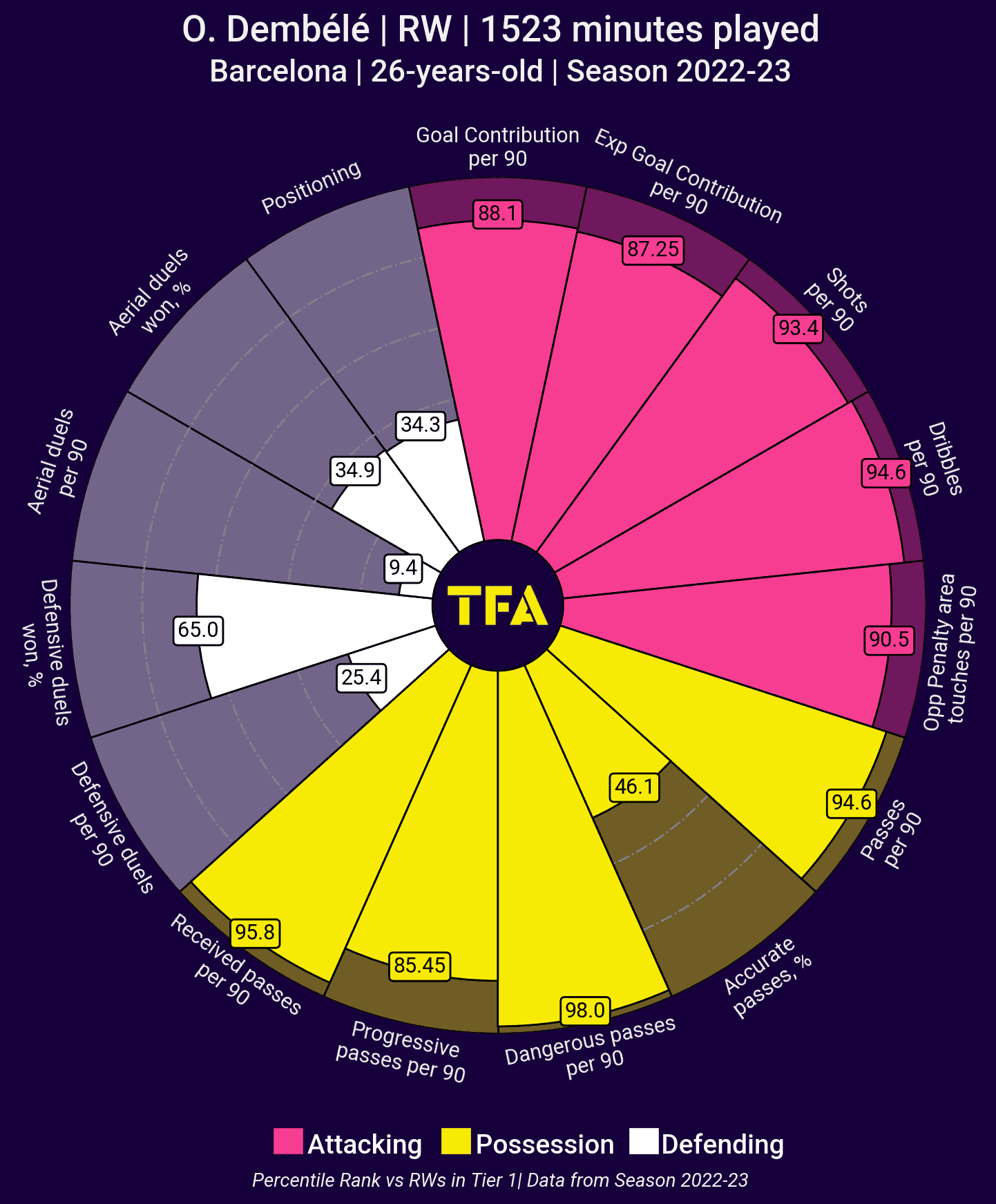
As we can see from Dembélé’s data profile here, he is unbelievable in attack.
The Frenchman managed to top the charts in almost every on-the-ball category we have analysed with our tools at TotalFootballAnalysis.
From progression prowess, chance-creation, disruption, shots, and expected goal contribution values, Dembélé does it all.
Quite clearly, we are talking about an immense presence in Barcelona’s team that will now leave an equally big hole to fill.
It doesn’t help that Xavi’s tactics were very much based on Dembélé’s presence on the wings.
The coach loves the overload-to-isolate approach, often populating the left side of the pitch before ejecting Dembélé on the other side, ideally isolated against a marker 1vs1.
In such scenarios, the defenders are as good as already beaten.
And there lies Dembélé’s actual value; he may not show on the scoresheet as often, but his presence is felt nonetheless.
Looking at more data, we can see more details about his role in Barcelona in the following graph.
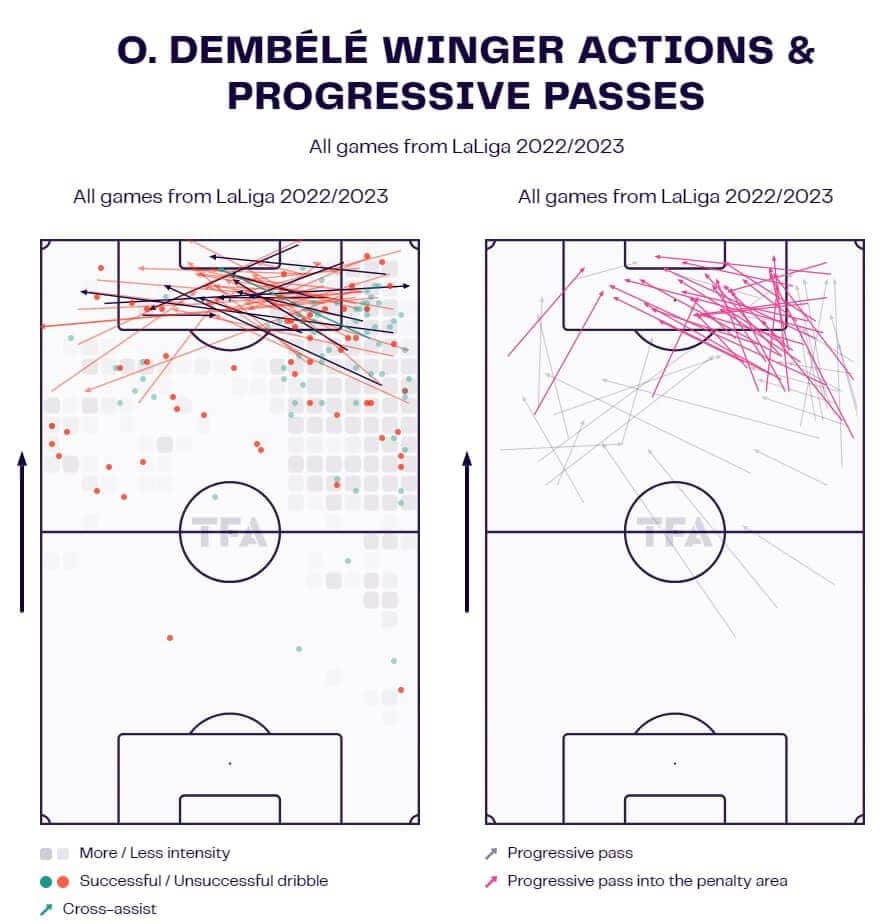
As noted earlier in this data analysis, Dembélé is an elite creator and progressor of the ball.
On the left side of this graph, you can see his winger actions (dribbles, crosses and cross-assists), while on the right, we have his progressive passes.
The interesting thing to note is his area of involvement.
Dembélé can be used on both flanks due to his am bipedal nature, and while he is clearly more effective on the right, this raises his value even more.
But it’s also quite intriguing to see where his intensity is at its highest; Dembélé likes to invert and occupy the half-space quite a lot.
Yes, he can hold width and attack space, but he prefers the ball to be played into his feet, and then he likes to hold onto it, dribble, carry, and disrupt the defensive structure.
That is why we don’t see many crosses into the box from that initial wide position, just at the entrance to the final third.
Sure, Dembélé receives and spends time there, but he rarely immediately releases the ball from there.
This can also be seen in his progressive passing; most passes that find their way into the box start just outside it in the right half-space, usually following an inverted run from the flank.
But all that being said, his final product is still not there for such an elite profile.
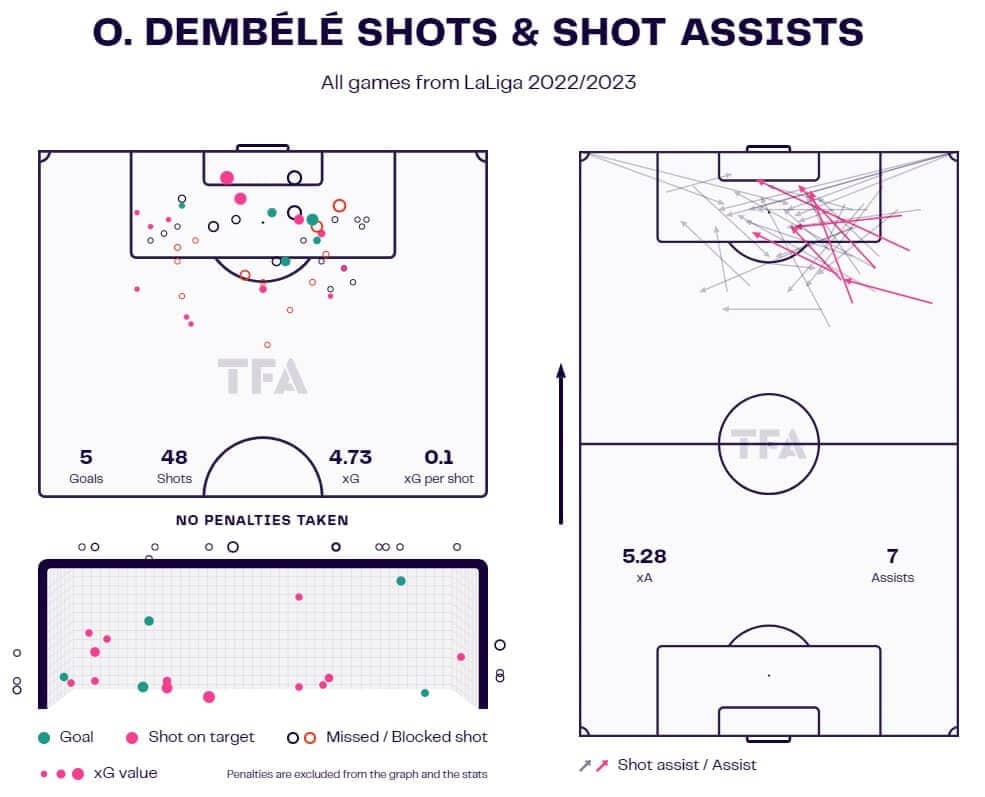
Five goals and seven assists from 4.73 xG and 5.28 xA, respectively, indicate overperformance, but those numbers are nowhere near elite.
Dembélé is not about the final ball despite his unreal tool kit.
Naturally, he could’ve gotten more had he been more available, but even during his most consistent spells, those numbers did not step into a world-class output.
Luckily, however, they never really needed to.
Except maybe on that one night against Liverpool.
But who even remembers that by now, right?
Either way, replicating his influence with what they currently have will take a lot of work, so Xavi might want to look into the market to find someone more capable of producing such numbers.
Raphinha is already at the club, but Raphinha, as good as he is, is a different type of winger.
He’s a leftie who inverts and focuses on creative passing, not a chaotic presence out wide who exploits space like no one else on the planet.
The profiles are different, which means Xavi would also have to adjust his tactics accordingly.
But who should he get if he decides against it and instead dips his toes into the market?
We consulted xGold and some data to find out.
The parameters were simple: we’re looking for players who primarily play out wide on the right, up to age 26, worth no more than €50M, with at least 1000 minutes played in 2022/23 and who can produce similar outputs to Dembélé.
Here’s what the data threw out.
Nico Williams Scouting Report & Style Of Play
When it comes down to it, Nico Williams isn’t a shocking name on this list.
He is already LaLiga proven, has that x-factor Dembélé has, is very versatile in his profile and tool kit — and reasonably young to boot, giving more scope for moulding and preferential development.
Not to mention that Xavi’s highly vertical tactical identity would go hand-in-hand with one of Spain’s best space exploiters.
Nico is well-known in LaLiga and Barcelona know him quite well too.
He is a regular menace for their backline due to his quick feet, incredible pace and strength, and eye for goal.
But first, let’s see how he compares to Dembélé regarding statistics.
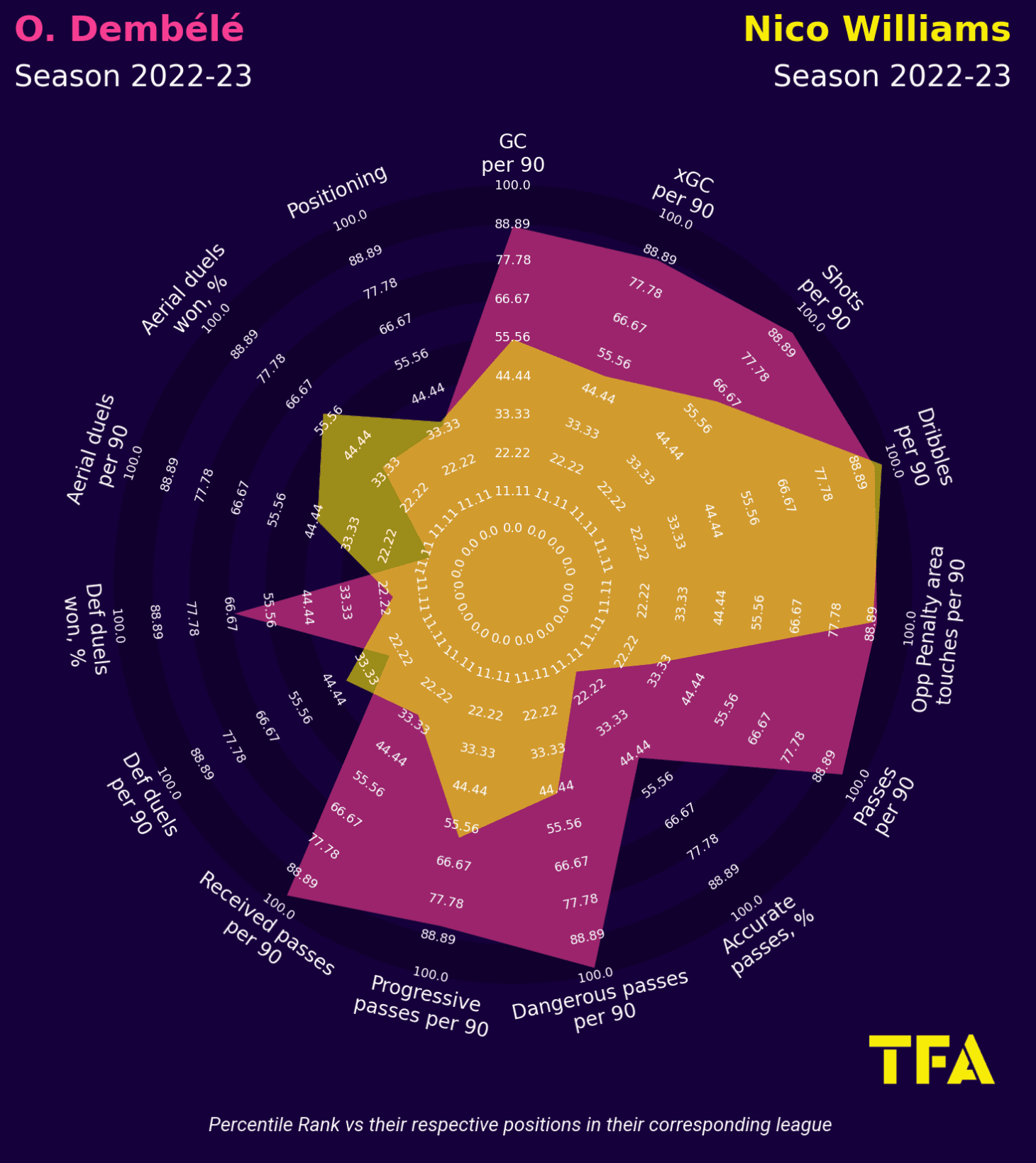
Interestingly, our xGold tool didn’t flag Nico as a precise match to Dembélé when it comes to data.
Sure, their profiles overlap in some regard, but due to the discrepancy between Barcelona and Athletic Club’s tactical ideologies, their statistical profiles aren’t a perfect match, far from it.
However, Nico is also well-rounded, and his numbers are somewhat deflated due to Athletic Club’s on-the-ball tendencies — alternatively, we could also say Barcelona’s on-the-ball tendencies inflate Dembélé’s numbers.
Either way, this created a rift in their respective graphs.
But even with that said, we can see the key elements are already there: Nico is a player used to being heavily involved in open play, an elite dribbler, a great progressor and a good goal-scoring presence.
Additionally, he is much more fit and also a more eager and involved defender.
In certain aspects, he is even an upgrade on the illustrious Frenchman.
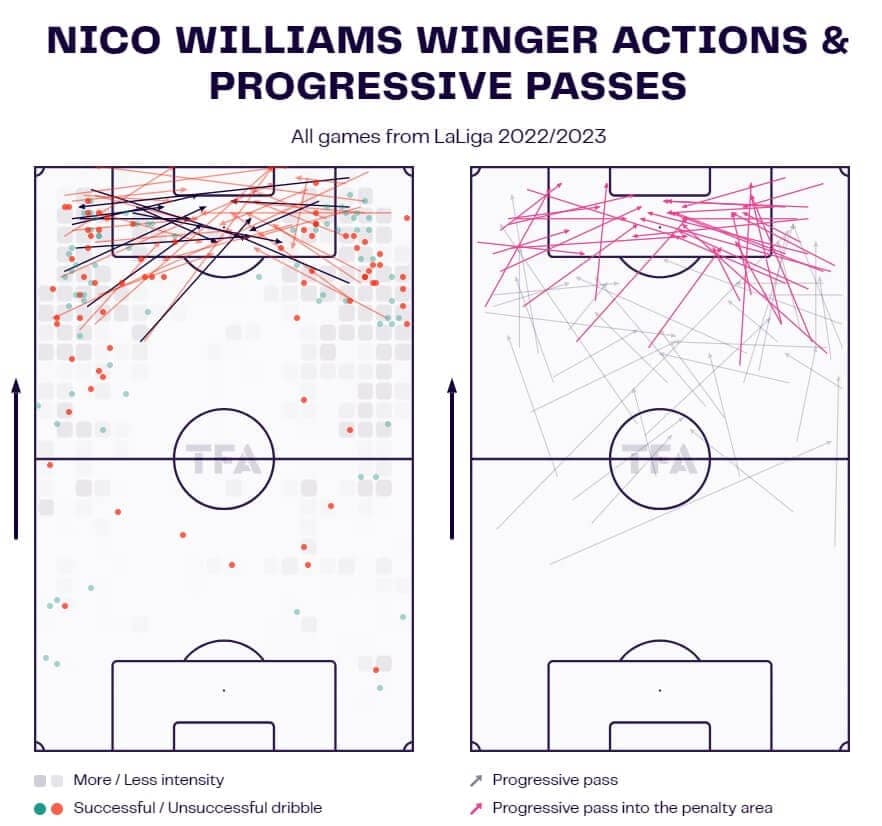
But his winger actions and progression will give us a glimpse into what makes him suitable to become Dembélé’s replacement.
Nico is equally adept at playing on both sides and has similar tendencies as well.
Notice how he starts wide but inevitably cuts into the half-spaces.
From here, he can deploy crosses into the box.
At the same time, his progression follows the same pattern: receive, cut in, deploy.
He is arguably a higher presence overall, as Dembélé often receives far deeper on the pitch, which is also influenced by how Barcelona moves the ball.
Nico can be more involved when needed; sure, his pass volume would inevitably increase, even exponentially so, but if Xavi is to continue with the overload to isolate tactics, Nico could theoretically be given a less technically demanding role too.
Yes, his excellent ball striking makes him lethal close to and farther away from the box, but he’s still best utilised when attacking that space, as can be seen in the following image.

Notice Nico’s starting and end points.
Few defenders stand a chance against this elite space exploiter in a foot race.
Indeed, you can him more involved, demand more touches and better technicality in tight spaces.
But that wouldn’t necessarily always get the best out of him.
The same was true with Dembélé.
Of course, snatching Nico from the jaws of Athletic Club is still much easier said than done.
They have a particular culture at the club, which is respected, and their homegrown players are incredibly loyal.
It’s admirable and unique and ultimately makes them such a special collective.
But it’s also very frustrating for outsiders who would love nothing more than to share some of that Basque excellence.
David Neres Scouting Report & Style Of Play
Now, David Neres is quite interesting for a couple of reasons.
Number one, looking purely at the statistics and data analysis, his profile matches that of Dembélé much more than someone like Nico does, for example.
That on its own is already a great sign.
However, rarely, a player picked up by data is also quite a great eye-test match too, which is the case here with Neres.
Rarely anyone can replicate Dembélé’s chaos and dynamism, but Neres could theoretically thrive in that same role at Barcelona.
Xavi could use him as the disruptor profile down the right side, someone who can not only eat up space but also dismantle deep blocks as and when necessary.
Here’s a quick data comparison of the two in the following image.
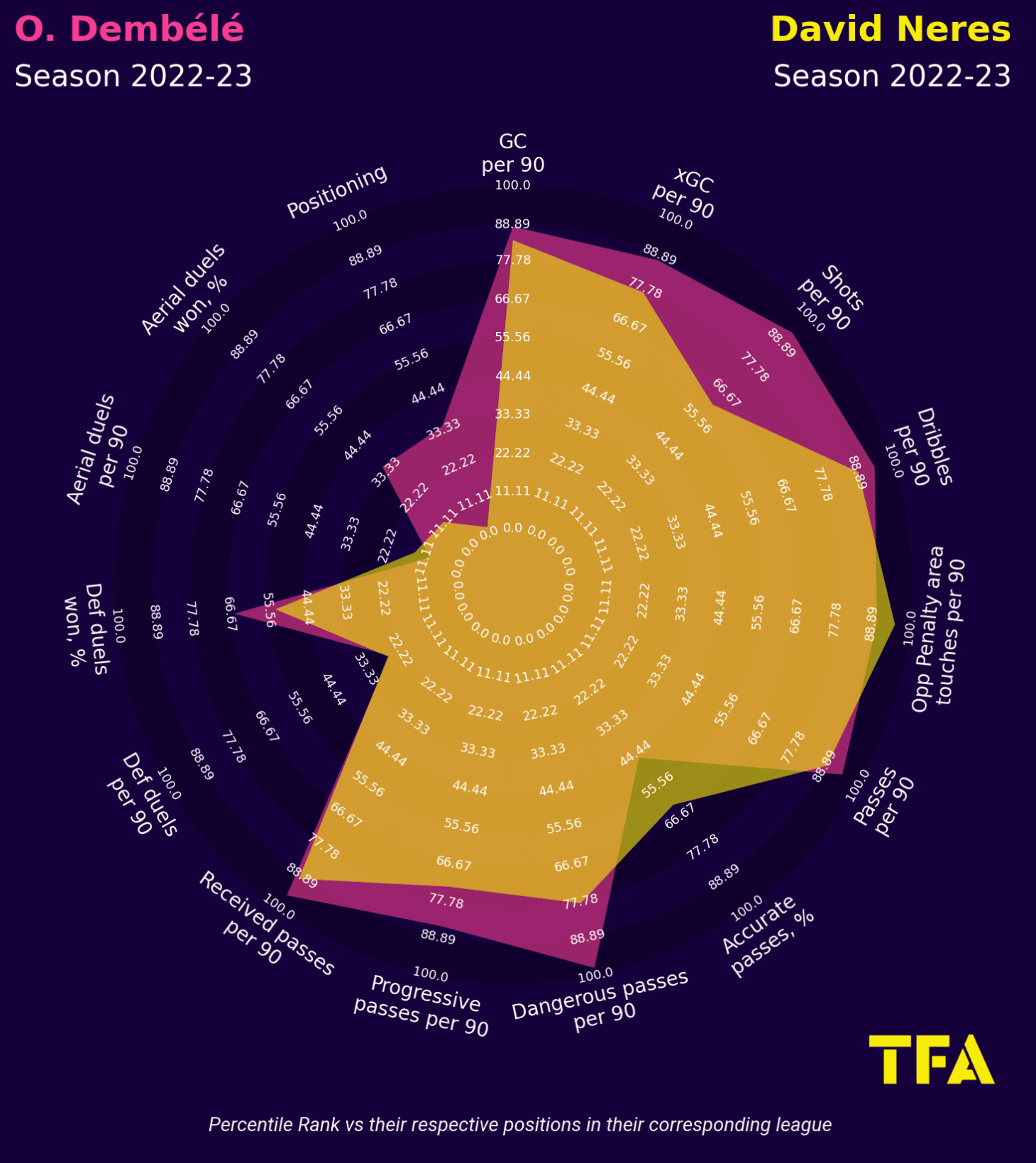
The first thing you’ll notice is probably how the two match almost perfectly.
According to their data profiles, the two are virtually the same.
Of course, that’s not actually the case, but it’s a good foundation for further scouting.
If Barcelona, or anyone else for that matter, were looking for a great dribbler, progressor, and goal-threat right-winger/right attacking midfielder, Neres would undoubtedly fit the bill and then some.
One could argue that he’s even slightly more dependable on the ball, as seen from his accurate passes percentage, which is higher than Dembélé’s.
Naturally, the Frenchman plays more passes per 90 and is more proactive than Neres, both of which impact the accuracy in the long run.
But all of that being said, there is no escaping the similarities between the two.
Even when we look at Neres’ 2022/23 winger actions and progressive passing, as seen in the following image.
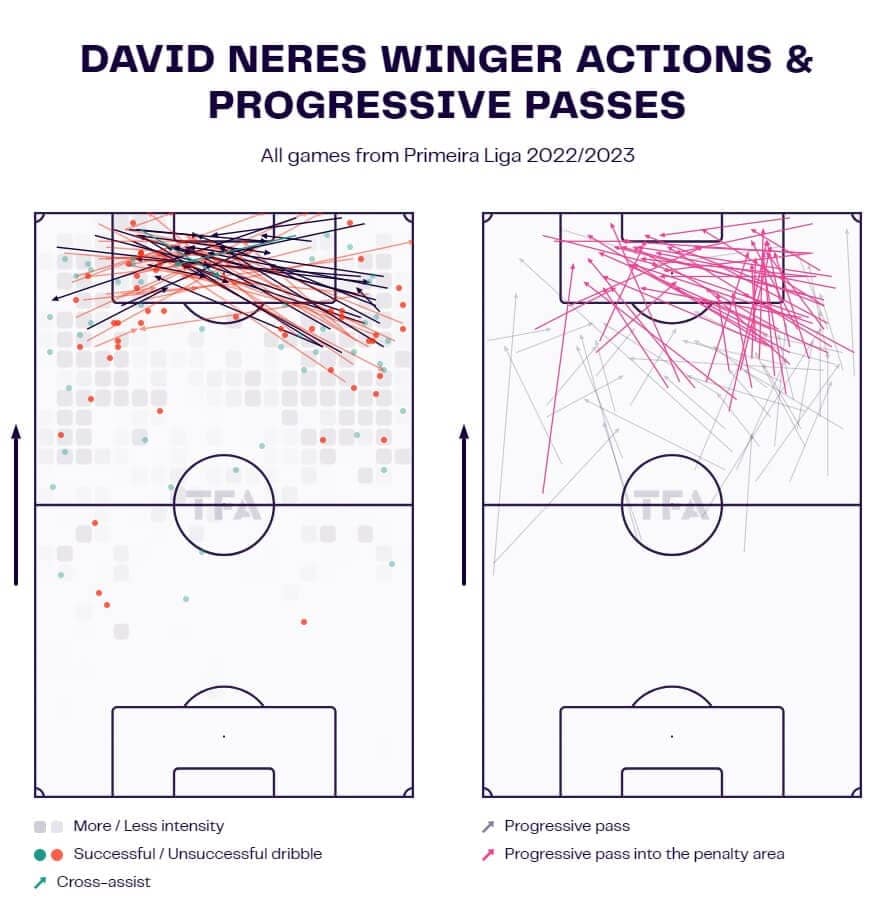
Again, we get the instant notion Neres is a winger that can be deployed on both flanks and has similar final-third tendencies when on the ball.
However, it does seem his output is even bigger than Dembélé’s, suggesting he’s more of a creative presence when it comes to passing, whereas Dembélé loves to carry the ball and disrupt that way.
It’s a different threat, but it can still work quite well.
Similarly, the start-point of many of those passes and crosses is slightly wider-positioned than Dembélé’s.
Progressive passes are pretty similar, yes, but Neres’ distribution starts from a wide position on the right and is slightly inverted on the left.
But he also loves the half-spaces, as we can see the intensity is at its highest in those areas of the pitch.
Looking at his final ball quality and in-possession preferences, Barcelona could get a lot of value out of it.
Neres can dribble and manipulate the ball well, so you can count on him beating his man more often than not.
But he can follow that up with a great pass, too.
We can see something similar in the sequence below.
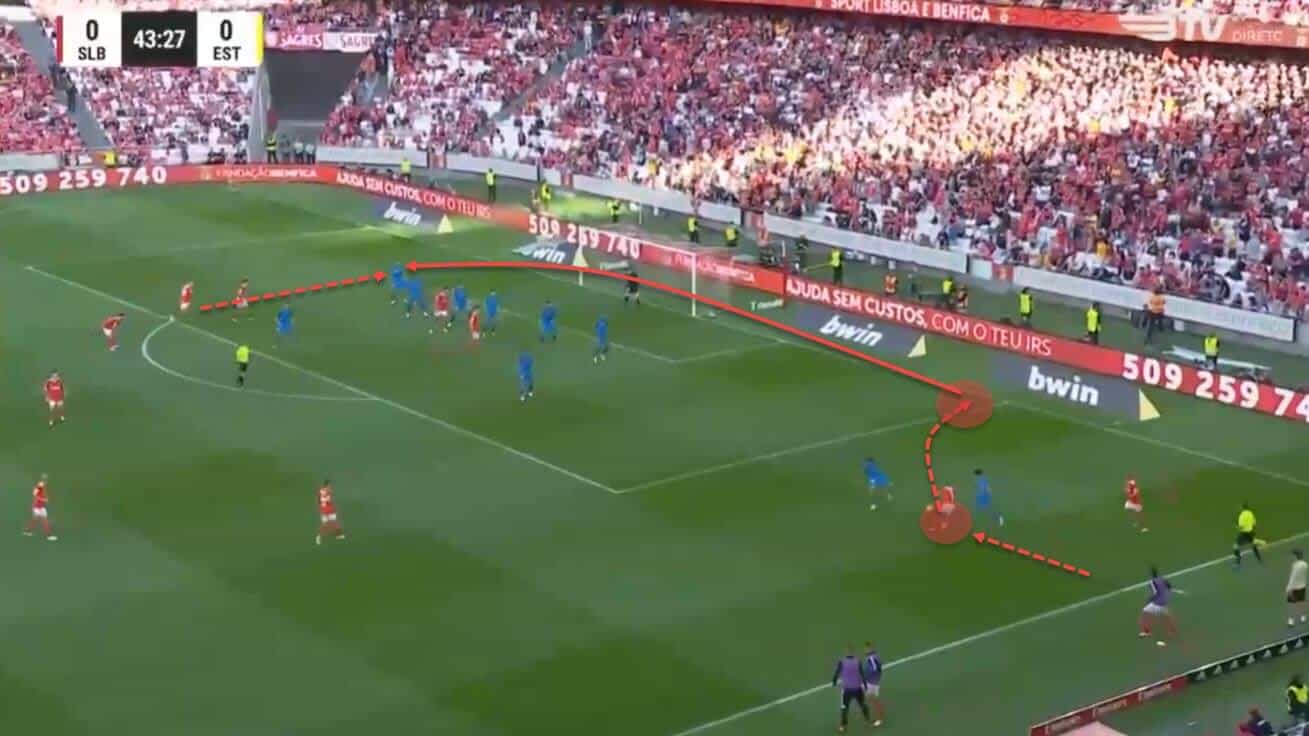
Some of his best actions often include a through ball or a shot-assist, which isn’t necessarily what Dembélé’s actions always translate into.
Of course, the Frenchman’s attacking output is still off the charts, but as mentioned earlier in this data analysis, it’s not always clearly visible on the scoresheet.
It remains to be seen whether Neres would be a realistic signing, but there is no doubt he could get the job done.
Would Barcelona pull the trigger?
Michael Olise Scouting Report & Style Of Play
The final name on this list will be that of Michael Olise.
However, It must be noted that his profile somewhat differs from Dembélé’s and the other two candidates.
He is a right-winger with a similar skill set but doesn’t necessarily perform the same chaotic role the other three are well capable of.
Dembélé is not a link-up expert, nor is he someone who ensures control; quite the opposite.
However, Olise would likely do just that.
He is a winger someone like Manchester City or Arsenal would likely sign, as such a profile leans more towards sustained pressure in the final third rather than exploiting acres of open space.
In that sense, Xavi wouldn’t necessarily get a direct Dembélé replacement, as his approach would still have to be tweaked with Olise in tow.
But the player’s quality is such that it wouldn’t particularly matter either.
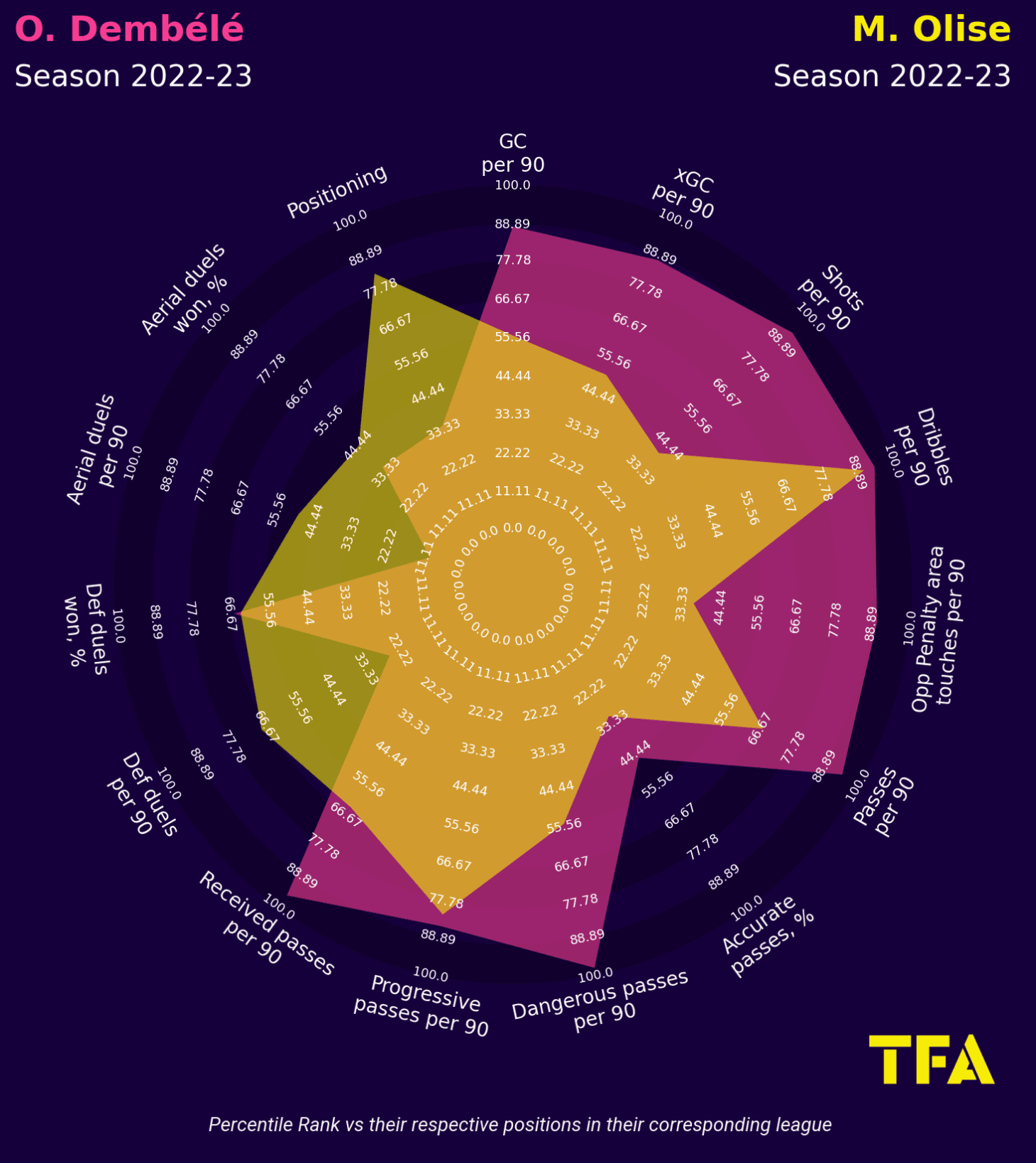
Looking at their respective data profiles, the statistics confirm the initial thesis: Olise is not Dembélé.
But that’s not a bad thing at all.
Barcelona may need to replace the Frenchman, but nowhere does it say it has to be with the same profile.
Perhaps the answer to their issues lies in a different type of player that won’t necessarily invite verticality and chaos to such an extent.
That someone could also be Olise.
He’s excellent on the ball and can link up and progress play at a very high level.
Similarly, he is comfortable with volume and can still offer quite a lot in terms of dynamism and dribbling, as the data earlier show.
Of course, given Crystal Palace’s operating style and the overall difference in quality and dominance in their respective leagues, his statistics aren’t necessarily as highlighted as Dembélé’s.
This has to be taken into account.
However, despite that, Olise impresses with his work rate and defensive responsibility.
Dembélé was never known as an exceptionally hardworking player, a significant flaw in a system that depends heavily on the team’s ability to press man-to-man and counter-press quickly.
With Olise, the damage could be minimised at the very least.
But looking at the following graph, we can see similarities do exist nonetheless.
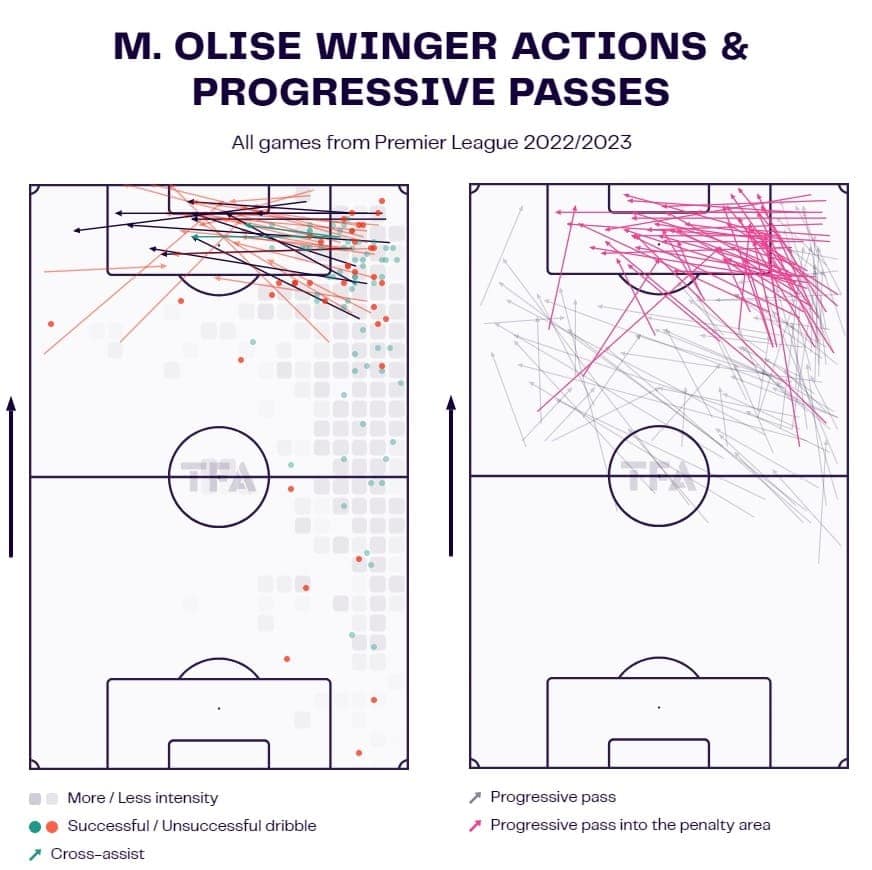
Olise’s sheer progression volume is much higher, even though he deploys fewer passes per 90.
This has to do with his role and his profile.
Dembélé likes to carry and dribble, and his role doesn’t necessarily force him into intricate passing sequences.
Olise is far more inclined to do so, though.
He will position himself between the lines and combine with the players around him, often connecting the third and initiating sequences.
It’s not something Dembélé is incapable of doing, but at the same time, it’s not something usually required of him either.
The Crystal Palace ace also has excellent delivery, so wide distribution is not an issue.
Of course, we know Dembélé is more of an inverted presence once he actually gets on the ball, but that doesn’t mean Olise wouldn’t be effective.
At the time of writing this analysis, Barcelona still lacks a wide presence on the right, and Olise could offer that.
However, he can also provide a much more consistent link-up too.
Take the following sequence as a great example.
Again, this is Olise between the lines, connecting and orchestrating.
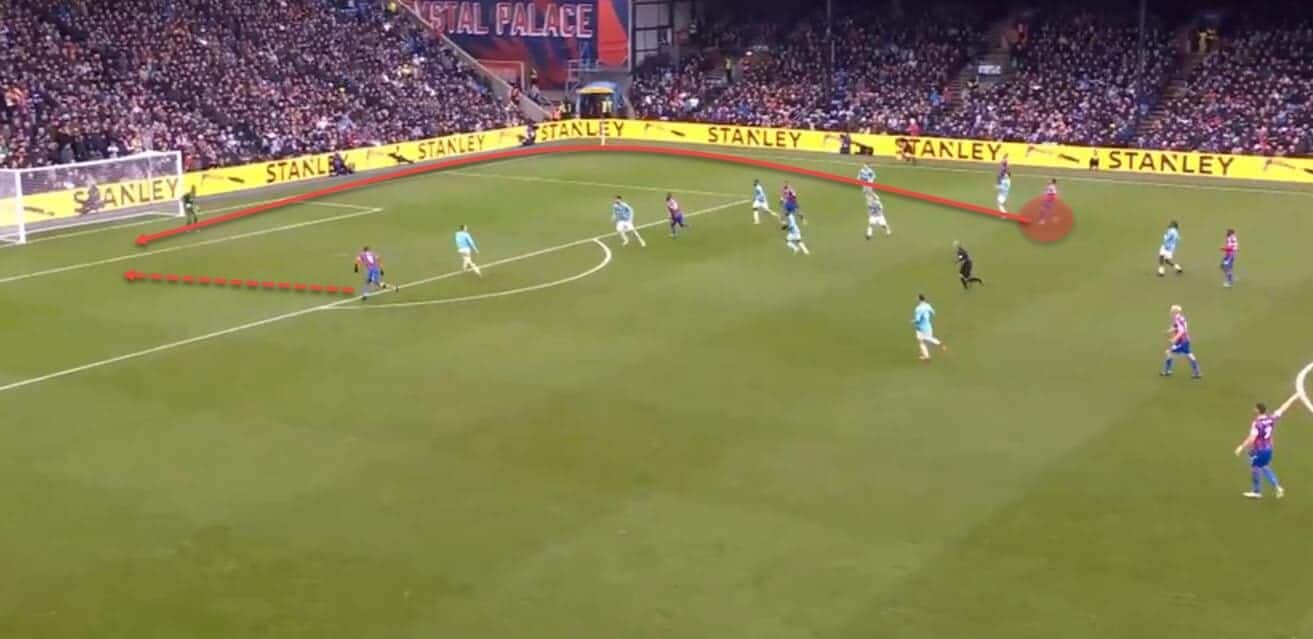
Another aspect we must note here is his willingness to immediately attack the space behind following a successful lay-off to the flanks.
Palace is a very expansive and vertical team, so exploiting space is something Olise is used to doing.
At Barcelona, this particular trait would be invaluable, too.
But he can also help them establish a different identity, or rather, retain their original one.
According to the latest reports, Olise would also be relatively cheap, as cheap as Dembélé replacements go.
Barcelona managed to cash in at least a little bit from the Dembélé deal, so there is reason to believe they have the financial power for such a transfer.
Of course, there are other priorities at the club, but if Xavi wants a new right-winger, Olise should be up near the top of the list.
Conclusion
While these names are all fairly interesting, a lot depends on Barcelona’s financial power.
Can they go into the market and compete for these names? It’s complicated to say because their current situation is quite blurry, to say the least.
But, if they wanted to replace Dembélé with a new arrival, these three players would be far from the worst options.
There are more, of course, some more obscure than others.
But it’s also unlikely Barcelona would risk a lot for such a prominent role in the team.
That’s why all three names on this list are established.
Whatever happens, however, it will be interesting to follow their involvement in the summer transfer window.
Even when broke, Barcelona somehow manage to steal the headlines.
We saw it with Lionel Messi, Bernardo Silva and Neymar Junior.
And it’s unlikely to stop any time soon.

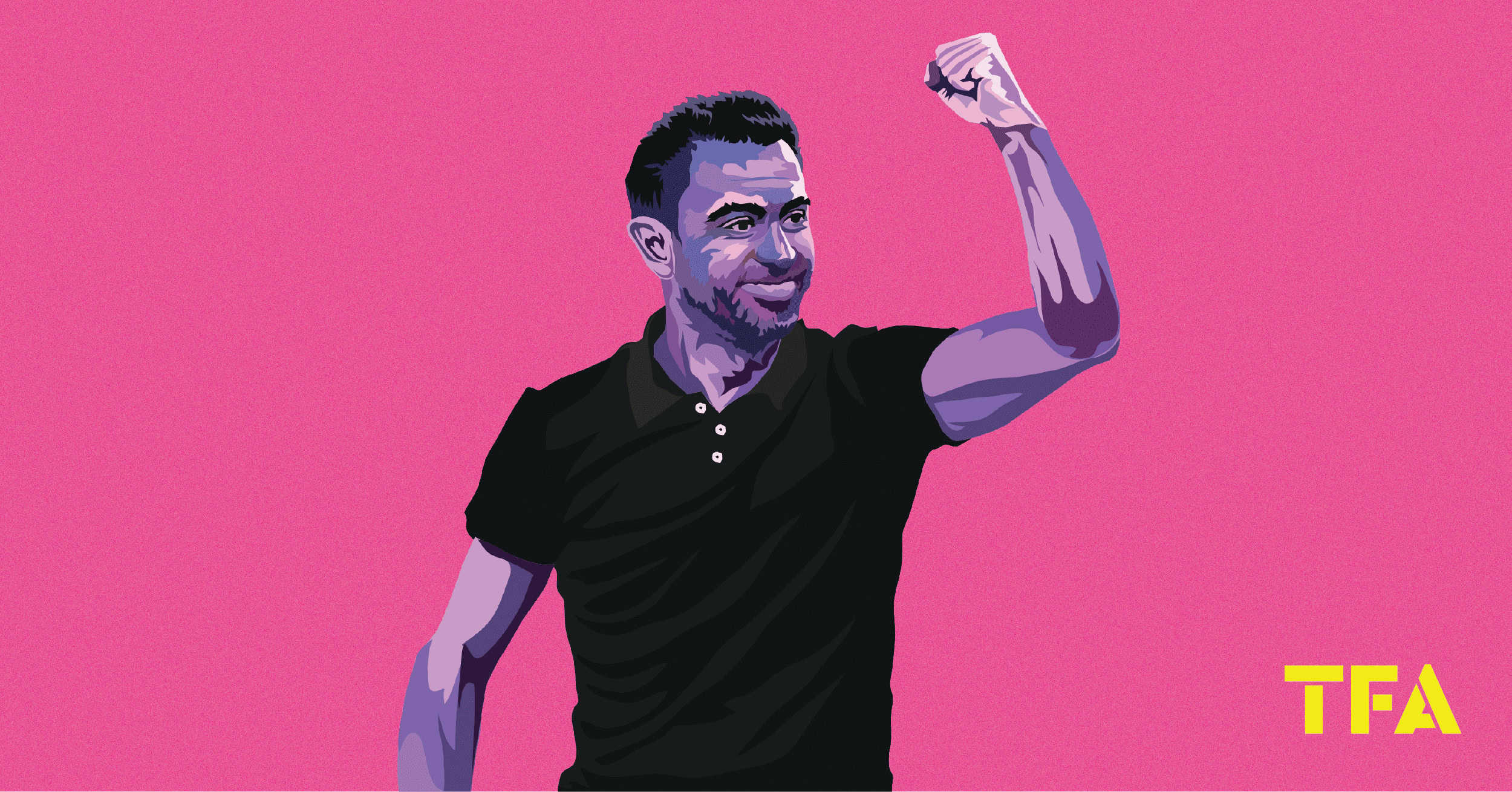




Comments